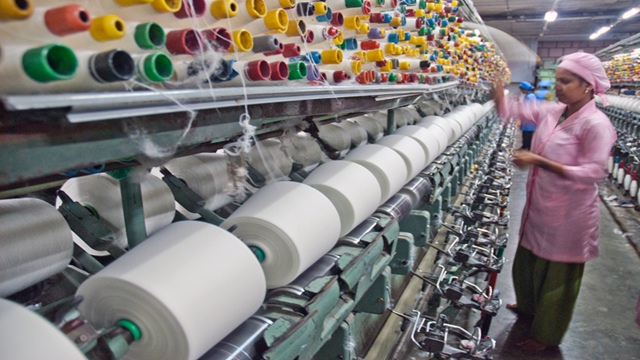Rubel Rana
Published:2018-04-07 16:48:59 BdST
Industrial employment growth slows
FT ONLINE
Employment growth in the industrial sector has fallen since 2013 due to "automation" of some factories and the closure of many clothing units, according to government survey findings and economists.
Between fiscal years 2013 and 2017, the share of industrial jobs out of the total employment dropped from 23 per cent to 20.4 per cent, according to the latest labour force survey of the Bangladesh Bureau of Statistics (BBS).
And the employment growth in the manufacturing sector started declining after 2013.
The number of people engaged in industries ranged from 12.1 million to 12.3 million for eight years when the total employment increased to 60.7 million in 2017 from 54.1 million in 2010, the survey shows.
Labour experts said that the major sectors -- clothing, textile and food products -- have seen low growth and in some cases, recorded negative growth since 2013.
They said the employment growth in the country's clothing sector fell due to "automation" and closure of many factories owing to the compliance issues by Accord and Alliance after the Rana Plaza disaster in 2013.
Rizwanul Islam, an international labour market expert and former special adviser at the International Labour Organisation (ILO): "In the apparel industry, both output and employment grew (after 2013), but employment grew at a much slower rate compared to the previous years."
He found two main reasons -- one is automation in the industry leading to the drop-off in labour requirement and another is the decline in the number of factories in operation.
He also said there had been a change in the size-structure of the industry -- larger units are now predominant. "And they may be adopting more capital-intensive technologies."
Mr Islam said in the textile industry, there has been a decline in the production of textile fabrics, which resulted in reduced employment.
In the jute textile industry, production has generally stagnated. As a result, there has been little employment growth.
In the food industry, employment declined in absolute number, although output growth was better.
Rushidan Islam Rahman, a labour market expert and executive chairperson of the Centre for Development & Employment Research (CDER), told that this is a manifestation of poor industrial growth in the country.
"We've been observing stagnation on the country's industrial front and this is nothing but a chain effect,"
Ms Rahman, who is also a director of the Bangladesh Bank, expects that there may be a "slight" increase in employment in the industrial sector this financial year.
Echoing Mr Islam, Khondaker Golam Moazzem, research director of the Centre for Policy Dialogue, said that industrial growth-induced employment generation has declined in recent years.
He said the industrial sector didn't grow significantly as growth hovered between 10 and 11 per cent between 2015 and 2017.
He said the CPD's ongoing research, based on 193 garment factories in the country, showed that female workforce declined to 61 per cent in 2017 from 70 per cent in 2012.
Mr Moazzem said automation was the key reason behind the decline.
Females were lagging behind handling newer machinery, which helped males grab the market, he said.
He said that the declining industrial employment is alarming for the country's economy in long term as the key development agenda of the country is to make a labour-intensive industry for the reduction of poverty and inequality.
He also noted that the imposition of anti-dumping duty on Bangladeshi products by India has come as blow for the jute industry.
The number of employment in the jute sector might reduce in the coming days if export couldn't show a significant rise.
Apparel sector executives said that there is automation in the readymade garment industry but the employment suffered mostly due to shutdown of factories.
Faruque Hassan, a senior vice president of the Bangladesh Garment Manufacturers and Exporters Association, said that female workforce has declined to some extent.
He said the knitting factories increased in recent years, which employ mostly male workers.
He said that many new factories with world-class working environment have been set up but at the same time hundreds of factories were shut under the reformation process after the Rana Plaza incident.
However Rizwanul Islam said the issue of employment has not featured in the country's public policy domain.
"I would even suggest that the issue of employment be mainstreamed into policymaking,' he said. "By 'mainstreaming', I mean taking into account the employment implications of all development programmes and policies in the process of making decisions on them.
Unauthorized use or reproduction of The Finance Today content for commercial purposes is strictly prohibited.


